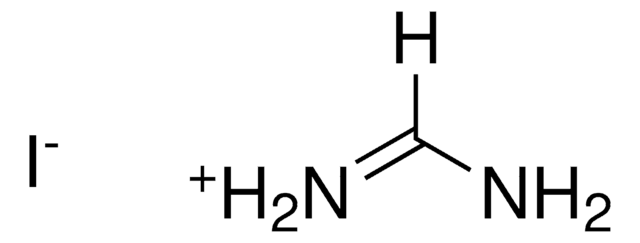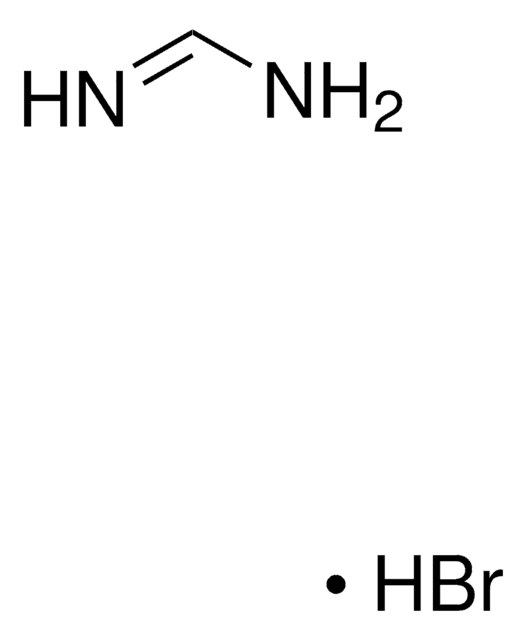912603
Di-n-propylammonium bromide
Sinónimos:
1-Propanamine, N-propyl-, DNPRAB, Greatcell Solar®, Hydrobromide (8CI) dipropylammonium bromide, Hydrobromide (9CI) dipropylamine
Iniciar sesiónpara Ver la Fijación de precios por contrato y de la organización
About This Item
Fórmula empírica (notación de Hill):
C6H16BrN
Número de CAS:
Peso molecular:
182.10
MDL number:
UNSPSC Code:
12352101
NACRES:
NA.23
Productos recomendados
Application
Organohalide based perovskites have emerged as an important class of material for solar cell applications. The variations/substitution in organohalide cations and anions is employed for the optimization of the band gap, carrier diffusion length, and power conversion efficiency of perovskites based solar cells.
Legal Information
Product of Greatcell Solar Materials Pty Ltd.
Greatcell Solar is a registered trademark of Greatcell Solar Materials Pty Ltd.
Greatcell Solar is a registered trademark of Greatcell Solar Materials Pty Ltd.
Greatcell Solar is a registered trademark of Greatcell Solar
Storage Class
11 - Combustible Solids
wgk_germany
WGK 3
flash_point_f
Not applicable
flash_point_c
Not applicable
Certificados de análisis (COA)
Busque Certificados de análisis (COA) introduciendo el número de lote del producto. Los números de lote se encuentran en la etiqueta del producto después de las palabras «Lot» o «Batch»
¿Ya tiene este producto?
Encuentre la documentación para los productos que ha comprado recientemente en la Biblioteca de documentos.
High Efficiency and High Open Circuit Voltage in Quasi 2D Perovskite Based Solar Cells.
Cohen B E, et al.
Advances in Functional Materials, 27(5), 1604733-1604733 (2017)
Lingling Mao et al.
Journal of the American Chemical Society, 139(14), 5210-5215 (2017-03-18)
Hybrid inorganic-organic perovskites are developing rapidly as high performance semiconductors. Recently, two-dimensional (2D) perovskites were found to have white-light, broadband emission in the visible range that was attributed mainly to the role of self-trapped excitons (STEs). Here, we describe three
Eran Edri et al.
The journal of physical chemistry letters, 4(6), 897-902 (2013-03-21)
Mesoscopic solar cells, based on solution-processed organic-inorganic perovskite absorbers, are a promising avenue for converting solar to electrical energy. We used solution-processed organic-inorganic lead halide perovskite absorbers, in conjunction with organic hole conductors, to form high voltage solar cells. There
Nuestro equipo de científicos tiene experiencia en todas las áreas de investigación: Ciencias de la vida, Ciencia de los materiales, Síntesis química, Cromatografía, Analítica y muchas otras.
Póngase en contacto con el Servicio técnico






